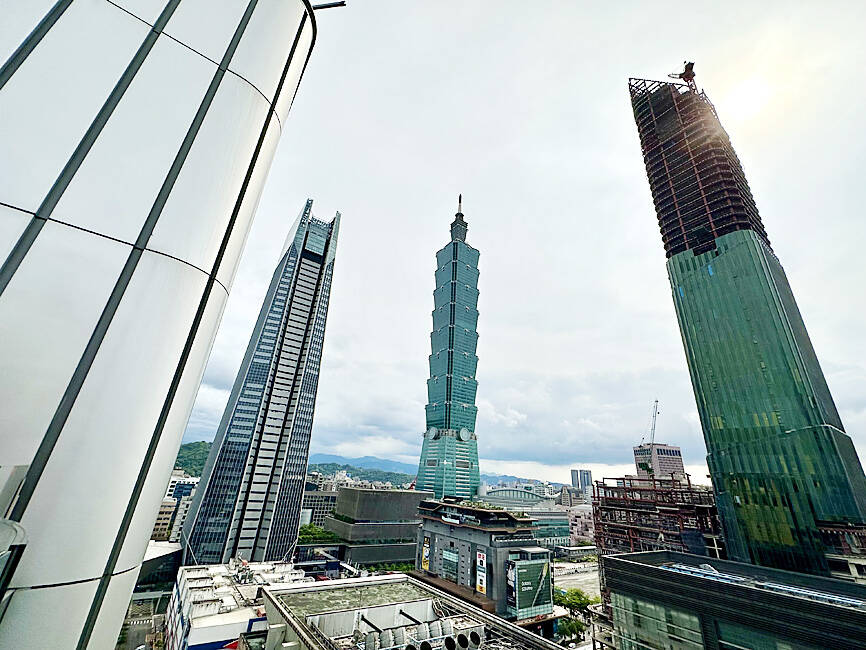Property transactions in the six special municipalities last month totaled 21,028 units, growing 23 percent from a year earlier, boosted by the preferential lending terms the government introduced in August for first-home purchases, real-estate brokers said on Wednesday.
The advent of the high sales season and first-home purchases encouraged by low interest rates underpinned the pickup in deals, Taipei-based Sinyi Realty Inc (信義房屋) said.
The volume for the whole of this year might now challenge the 300,000 unit mark, an important confidence threshold, the nation’s only listed broker said.

Photo: Hsu Yi-ping, Taipei Times
Buyers with real demand have dominated the market this year as a series of unfavorable policy measures scared away investors, Sinyi said, adding that low bases in the second half of last year helped drive the year-on-year improvement.
The uptick is most evident in Tainan, with a spike of 66.8 percent from a year earlier to 2,704 units, as people regained interest in owning apartments near technology firms, Great Home Realty Co (大家房屋) said.
Deals gained 54.6 percent to 5,955 units in New Taipei City, partly on the back of new house deliveries in Jhonghe (中和), Sinjhuang (新莊) and Sindian (新店) districts, it said.
Kaohsiung also benefited from new house deliveries, which helped lift transactions 15.5 percent to 2,961 units, local data showed.
Transactions in Taipei improved 17.3 percent to 2,259 units, while they rose 11.8 percent to 3,721 units in Taoyuan, official data showed.
Interest in existing homes also staged a comeback, Great Home said.
Taichung proved the only exception with an 8.6 percent year-on-year retreat in deals to 3,721 units, data showed.
A lack of affordable properties and new themes accounted for the below-par showing, Great Home said.

South Korea’s equity benchmark yesterday crossed a new milestone just a month after surpassing the once-unthinkable 5,000 mark as surging global memory demand powers the country’s biggest chipmakers. The KOSPI advanced as much as 2.6 percent to a record 6,123, with Samsung Electronics Co and SK Hynix Inc each gaining more than 2 percent. With the benchmark now up 45 percent this year, South Korea’s stock market capitalization has also moved past France’s, following last month’s overtaking of Germany’s. Long overlooked by foreign funds, despite being undervalued, South Korean stocks have now emerged as clear winners in the global market. The so-called “artificial intelligence

‘SEISMIC SHIFT’: The researcher forecast there would be about 1.1 billion mobile shipments this year, down from 1.26 billion the prior year and erasing years of gains The global smartphone market is expected to contract 12.9 percent this year due to the unprecedented memorychip shortage, marking “a crisis like no other,” researcher International Data Corp (IDC) said. The new forecast, a dramatic revision down from earlier estimates, gives the latest accounting of the ongoing memory crunch that is affecting every corner of the electronics industry. The demand for advanced memory to power artificial intelligence (AI) tasks has drained global supply until well into next year and jeopardizes the business model of many smartphone makers. IDC forecast about 1.1 billion mobile shipments this year, down from 1.26 billion the prior

People stand in a Pokemon store in Tokyo on Thursday. One of the world highest-grossing franchises is celebrated its 30th anniversary yesterday.

Chinese artificial intelligence (AI) start-up DeepSeek’s (深度求索) latest AI model, set to be released as soon as next week, was trained on Nvidia Corp’s most advanced AI chip, the Blackwell, a senior official of US President Donald Trump’s administration said on Monday, in what could represent a violation of US export controls. The US believes DeepSeek will remove the technical indicators that might reveal its use of American AI chips, the official said, adding that the Blackwells are likely clustered at its data center in Inner Mongolia, an autonomous region of China. The person declined to say how the US government received